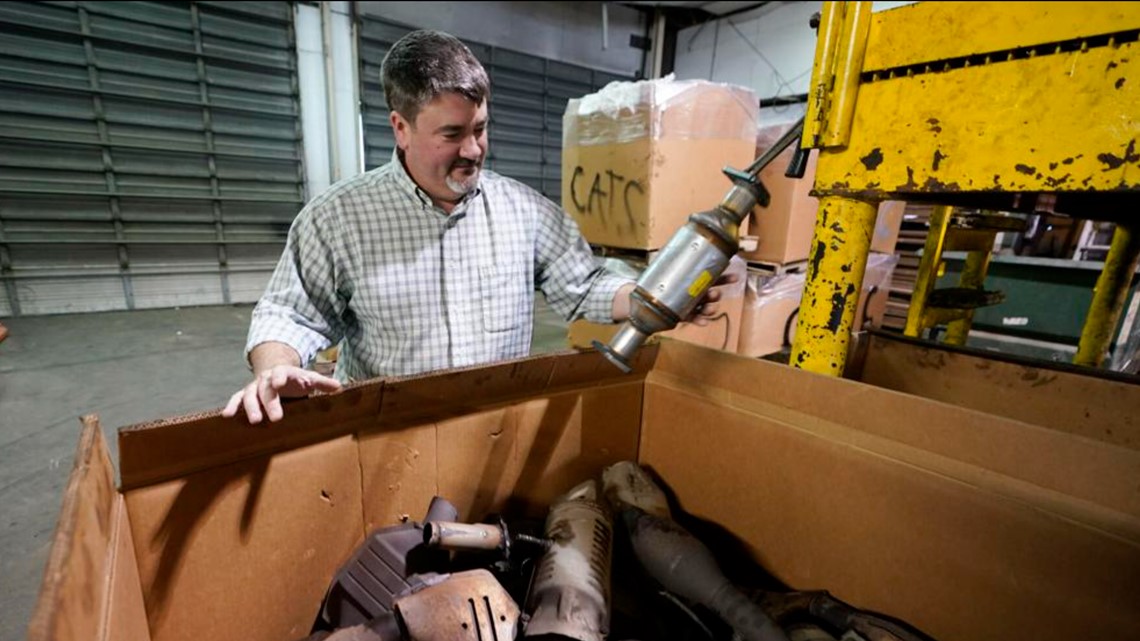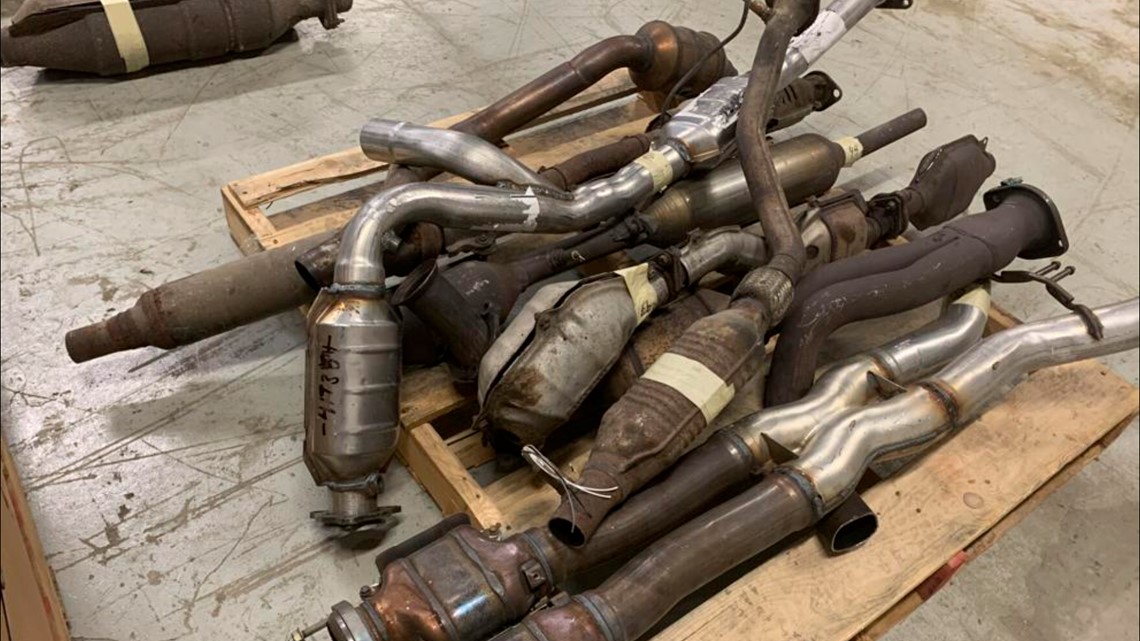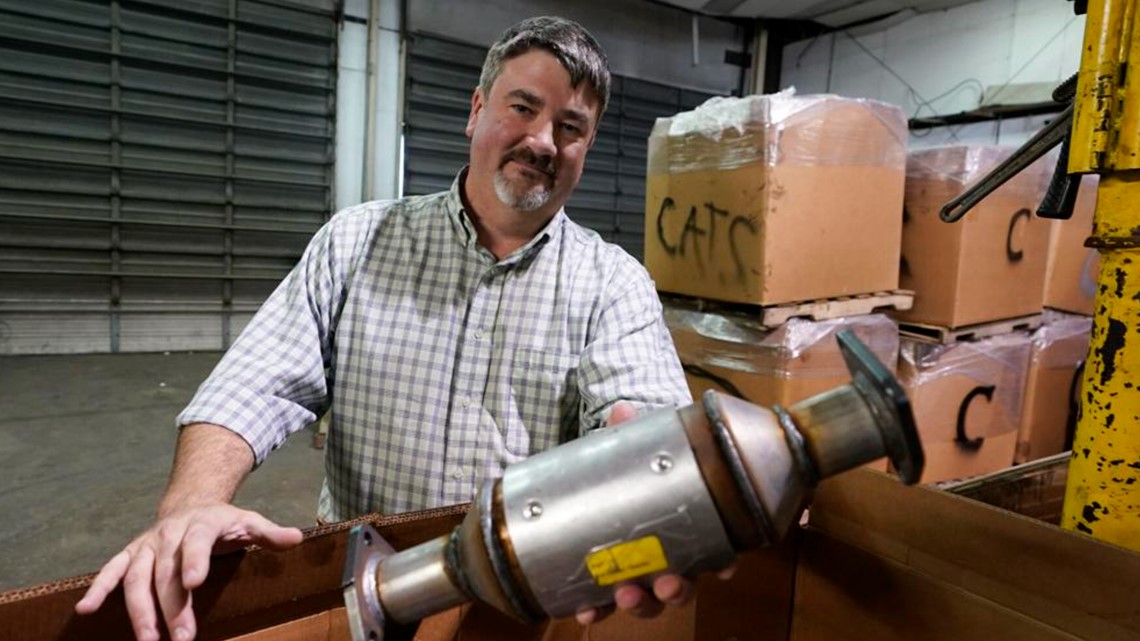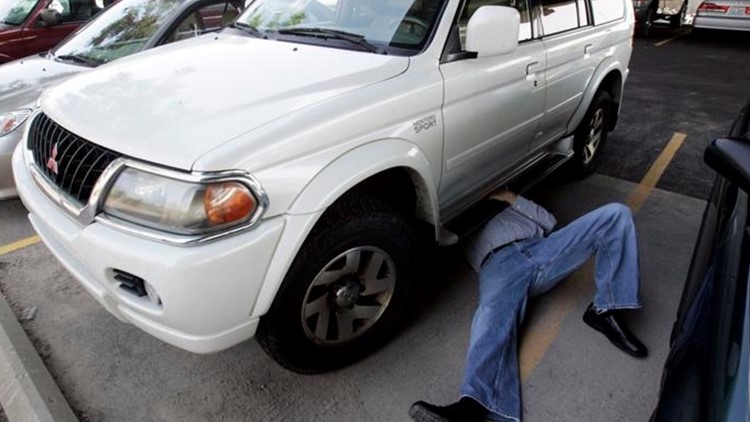BOISE, Idaho — This article originally appeared in the Idaho Press.
Across the country, in big cities, small towns and rural expanses, thieves are targeting auto parts — with a prime focus on catalytic converters.
The catalytic devices convert pollutants from motor vehicle engines into less-toxic emissions. They are stolen and sold to metal recyclers or in some instances body shops in need of auto parts.
The converters, also known as CATs, can fetch anywhere between $50 and $1,400, according to police departments and insurance agencies across the country.
“They are targeting the metals in the mufflers which they can sell to a metal scrap dealer, for around $200 to $400. They work fast, and can steal the item in less than two minutes. We have not caught any of the suspects but suspect they are a traveling group,” said Lieutenant Mike Budreau with the Medford Police Department in southern Oregon.
The city of more than 85,000 people saw 37 catalytic converter thefts in 2021 and nine so far this year, Budreau said.
Medford is not alone.
In the Treasure Valley, catalytic converter theft is also on the rise.
The Boise Police Department said that reported catalytic converter thefts rose from 12 in 2019 to 88 in 2021. This year, there have been 66 reports tallied by the BPD, according to department spokesperson Haley Williams.
The Nampa Police Department said there have been approximately 148 reported thefts from August 2021 to April 2022.
That figure also marks an increase in the city, according to Sgt. Mike Phillips. He added that there have likely been more because “Some victims don’t report, and other victims don’t know they have been the victim yet.”
A spokesperson from the Canyon County Sheriff’s Office estimated that “over the past two years, there have been about an 800% increase in catalytic converter thefts.”
On a national scale, it’s significant as well. According to the National Insurance Crime Bureau, which tracks crimes reported to insurance companies, the number of reported catalytic converter thefts raced from roughly 1,300 in 2018 to more than 52,000 in 2021.
Higher costs of metals because of inflation can help fetch more money from recyclers for thieves. Shortages of auto parts because of the impacts of the pandemic and supply chain problems could be driving some illegal demand for converters, law enforcement officials said. COVID-19 shutdowns in China, inflation in the U.S. and unpredictable demand have hampered automotive supply chains worldwide — including for parts.


Gone in 60 seconds
The Canyon County Sheriff’s Office said that thieves typically target vehicles with higher ground clearance, because converters are faster to pull and easier to reach.
“They also target businesses with a fleet of vehicles where they have access to multiple vehicles at a time,” Joe Decker, a spokesperson with the county, wrote in an email.
Patrick Orr, a spokesperson with the Ada County Sheriff’s Office, said that bigger pickup trucks – which are easier to get under and may have larger converters – seem to be targeted the most. He added, however, that thieves have stolen catalytic converters from all kinds of cars and trucks.
The Ada County Sheriff’s Office, which has also reported an increase in CAT theft over the past year, said that thieves use reciprocating saws – power tools commonly known as sawzalls – when going under cars and trucks to cut through and get to the converter.
“It seems to take anywhere from 30-to-90 seconds for thieves to cut through the metals and remove the converters,” Orr wrote in an email.
Sgt. Phillips, with Nampa Police, said with the right equipment and on certain vehicles, it can take individuals 30-45 seconds to steal a converter.
Williams, with the BPD, said that thieves can sell the converters to recyclers without providing identification.
Local law enforcement agencies said that thieves can pocket hundreds of dollars for a stolen converter.
The number can exceed $1,000 for a converter taken from a hybrid vehicle.
Nampa Police said the rise in catalytic converter theft in the city stems from individuals trading them for drugs or drug money.
“There are crooked crooks who turn a blind eye and buy these converters, even though they know they are more than likely stolen,” Sgt. Phillips said. “Those buying the converters are making lots of money.
“The people buying them pay the thief a low price, and then turn around and sell them to a smelter and get paid very well,” his email continued.
The Cheyenne Police Department in Wyoming saw 116 converter thefts in 2021 and 19 so far this year. Thieves can target commercial and personal vehicles.
“This criminal activity can take place during the day or at night. Thieves will crawl underneath the vehicle and cut the converter out with a saw,” said Detective Bureau Lieutenant Adam DeBall with the Cheyenne PD. “In most cases, you won’t know this has happened until you start your car. When you press the gas pedal, you may hear a loud noise.”
Law enforcement in Wyoming, Oregon and other states are also working with recycling centers to combat the theft rings but are making a limited number of arrests. Similar efforts have been previously undertaken with copper thefts, with varying degrees of success.
Orr, with Ada County Sheriff's Office, said that local scrap yards have been cooperative with the agency on local investigations and that “it is possible thieves are taking the stolen converters out of state.”
Replacing a stolen catalytic converter is not cheap. It can cost anywhere from $1,000-$2,000, according to local sheriff's offices.


Tips on theft prevention
Treasure Valley law enforcement agencies have a variety of tips to avoid CAT theft.
“It is almost impossible for law enforcement to tie a specific converter to a specific vehicle, to the subject who stole it, to the recycling company it was sold to,” Decker wrote. “The best thing to do is make your converter harder to steal and easier to identify if it does get stolen.”
Decker suggested including painting or engraving the converter with a unique marking to make it more identifiable, monitoring vehicles with video cameras or alarms, and parking vehicles where their exhausts are difficult to access, such as near a fence or wall.
He also suggested that people install an anti-theft device such as a shield, cage or welded cables around their converter.
Orr said attaching a skid plate to the bottom of a vehicle can be effective.
Nampa Police Sgt. Philips said residents should keep an eye out for suspicious activity in the community.
“We have had several of these thefts occur in broad daylight, in parking lots,” he wrote. “Everyone needs to help keep an eye and ear out for suspicious activity and noises.”
He added that people should not approach or try to apprehend a thief.
“We do not know if they are armed and what they might do,” he wrote.
Williams said that people should park in a garage if possible, and also in well-lit and high-traffic areas.


The boom in CAT thefts across the country has also spawned a cottage industry of anti-theft products that car dealers, fleet owners and consumers can use to lock the emissions devices.
A variety of companies offer locking devices aimed at discouraging catalytic crooks. Some require installation by an auto mechanic.
- In Texas, a company called Converter Guard offers an etching set and will put a car’s CAT into a national database for $249. If the CAT is stolen, the company promises to pay up to $2,500 in replacement costs.
- New York state officials have also launched a new etching and registration effort with the car dealers with police (including the New York City Police Department) to tag and track stolen converters. Parts of New York have seen a 200% increase in thefts of the emissions control device.
“The sharp increase in the number of catalytic converters being stolen across the country has police and legislators searching for a way to curb the thefts,” said Nichole Soriano, regional director for Travelers Insurance Co. and chair of the New York Anti Car Theft and Fraud Association at May 6 announcement of the tagging effort.
This article originally appeared in the Idaho Press, read more on IdahoPress.com.
Watch more Local News:
See the latest news from around the Treasure Valley and the Gem State in our YouTube playlist:



